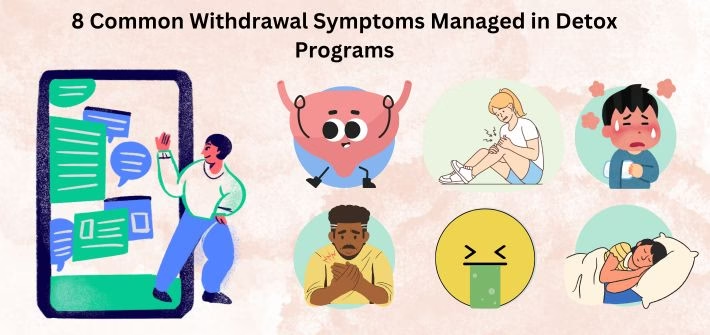Withdrawal has an impact on both body and mind when someone cuts back or quits substances they’ve grown dependent on. This applies to alcohol, opioids, benzodiazepines, or stimulants. Withdrawal can cause intense discomfort and, in some cases, threaten life. Detoxification marks the crucial first step to recover, and professional detox programs aim to handle these symptoms and well. To grasp the most common withdrawal symptoms can help people and their families prepare for what’s ahead and see why medical oversight matters during detox.
Physical Pain and Discomfort
Physical pain stands out as one of the first and most obvious signs of withdrawal. The discomfort can vary from slight muscle soreness to intense joint aches, headaches, and stomach cramps. These problems often occur when people stop using opioids or alcohol. The body now used to having the substance around, reacts when it’s no longer there. In medical settings, doctors manage pain using non-addictive drugs plenty of fluids, and extra care to ease discomfort and stop any complications.
Nausea Vomiting, and Gut Problems
Stomach problems are a common sign of quitting drugs alcohol, opioids, and stimulants. Feeling sick and throwing up can cause dehydration and mess up your body’s salt balance if not handled right. You might also get diarrhea and lose your appetite, so getting good nutrition is a big part of detox care. Doctors keep an eye on how much you’re drinking and might give you medicine to stop you feeling sick. This helps keep you strong while you’re going through the process.
Worry and Panic Attacks
Mental health symptoms can be just as intense as physical ones. Worry is one of the biggest mental health hurdles during withdrawal. People might have racing thoughts, feel restless, or even have panic attacks. These signs show up a lot when quitting benzos and stimulants. In a Medical detox program, experts use a mix of therapy and safe meds to help steady moods and cut down on severe mental stress. Making a quiet helpful place is key to helping patients feel safe and centered.
Trouble Sleeping
Sleep problems are a common issue during withdrawal. Many drugs mess with the brain’s normal sleep-wake cycle, and stopping them can cause trouble falling asleep scary dreams, or broken sleep. Not getting enough rest makes other symptoms worse, like feeling cranky and tired, which makes it harder to get better. Detox experts often use good sleep habits, ways to relax, and when it makes sense short-term meds to help fix sleep patterns without creating new drug problems.

Sweating and Temperature Changes
The body’s autonomic nervous system can get out of whack during withdrawal causing too much sweating, chills, and symptoms like a fever. These happen a lot when people stop using alcohol and opioids and can scare those who don’t know what to expect. Medical teams keep an eye on vital signs and make sure the environment is comfortable to help with these symptoms. Sometimes, they use medicines to keep body temperature steady and cut down on extra sweating.
Depression and Mood Swings
Emotional ups and downs pose a big challenge when someone quits drugs. People often feel down, get annoyed , and have quick mood changes as their brain tries to get back to normal. These feelings might not last long, but they can be tough to handle and make you want to give up. Talking to counselors, connecting with others going through the same thing, and sticking to a daily plan help people deal with these emotional roller coasters. The experts who help with quitting drugs know how to spot signs of deeper mental health issues and step in to stop things from getting worse.
Cravings and Urges to Use
Even when you first stop using, you might want the drug. Your brain used to getting the substance, keeps asking for it even after you’ve quit. If you don’t handle these urges well, they can mess up your recovery. Detox programs teach you ways to cope, keep you busy, and motivate you to stay clean. Having a team to back you up and a set routine is key to dealing with these strong desires.
Feeling Tired and Sluggish
When your body cleans itself out, you often feel worn out. You might feel tired and sluggish if you’ve been using substances for a long time. Your body is working hard to get back to normal, and you might have low energy for a few days. Detox experts help you eat well, drink enough water, and do some light exercise to build your strength back up. They balance letting you rest with getting you back into your daily routine.
Conclusion
Withdrawal has an impact on every part of your body and mind. It’s a complex experience that affects people based on the drug and the person. The eight symptoms we talked about are the ones you’ll face during detox. Getting help from professionals to detox gives you a safe place where they can handle these symptoms well. This cuts down the chances of problems and sets you up for long-term recovery. With the right help, people can get through withdrawal with their pride intact and feel hopeful. This is the first step to living a healthier life without drugs.

